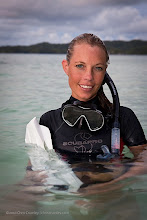
(One of the blacktips we caught and tagged.)
A few months ago, I was reminded how important it is to work with our children, raising a new generation of conservationists to take over where we leave off in the hopes they can be more successful than we were. I have always enjoyed teaching kids about sharks, loving how open minded and thoughtful they are. But this time, I had an even greater joy - I was given the opportunity to watch some pretty inspiring people infect young adults with a passion for sharks… and science.

(The students participating in the SFSSP the day I joined them.)
I met up with the South Florida Student Shark Program (SFSSP) in the Keys, one beautiful Sunday morning, with the intention of capturing their project on film for an Underwater Channel episode. Neil Hammerschlag, a dedicated scientist and conservationist, runs the two-year old program funded by the Hoover Foundation and University of Miami. Their goal? To study the habitat and health of the shark population in the keys to ensure the sharks’ continued critical existence in these waters. Their main scientific tools? High school students.

(The team in action. Pictures by Neil Hammerschlag.)
Yes, that’s right. High school students are doing much of the work. While I can shamefully recall being concerned with things like finding cool combat boots (yes, I was a little bit of a rebel) and my favorite band at the time (Depeche Mode of course), this group of young adults – at the same age I was - are worried enough about the health of the oceans to give up their weekends to attempt catching and tagging sharks.

(The SFSSP gang bragging about 13 sharks!!!)
I was thoroughly impressed and excited with the work Neil Hammerschlag, Leann Winn, Adam Matulik and the team are doing – going far beyond studying the range, size, and health of the local shark population – but also examining the high mercury content and other chemicals such us neurotoxins in the shark’s flesh. You see, their work gives all of us shark conservationists a powerful weapon in our arsenal to stop those who consume shark fin soup. As apex predators, the sharks are amassing dangerous doses of methyl-mercury in their flesh – even in their fins - which is consumed when they are eaten. One bowl of shark fin soup is often enough to cause birth defects in pregnant women, and mercury poisoning leads to sterility and nervous system issues. Mercury poisoning is so common that 1 in 3 Chinese born women tested in New York city had four times the FDA approved limit in their blood. Through the SFSSP’s work, high mercury levels in Floridian sharks can now be proven. What’s more, Neil’s team is contributing to a world-wide effort to examine shark tissue for other contaminants, including a chemical that leads to brain disorders such as Alzhemiers. Ironically the soup meant to symbolize health and prosperity is a dangerous concoction of environmental poisons.
On the day I joined the team, we headed to an area that was home to a deep channel between two Keys and set the initial ten drumlines. While I am usually the one covered in dead fish, it was such a treat to have eleven students eager to get messy! The students prepared the fish, baited the hooks, laid the lines and took samples. I was already smiling to see such enthusiasm when it was time to check the first line.
So imagine how big my smile was to find that on the 15 lines we set, we caught 13 sharks! A new SFSSP record! (And finally, maybe my curse was over. Yes, I am always the one who gets on a boat to see nothing and get no results only to hear from someone that only the day prior, that they saw synchronized white sharks breaching, or an aggregation of 100 whale sharks, or they tagged the world’s largest bull shark, or recorded a bait ball that consisted of 12 different elasmobranch species so big it was visible even in space.)

The boat was buzzing with activity as the team of scientists and students worked side by side to quickly pull in each shark minimizing impact on the animal, take its measurements and specifics, obtain a core sample and a fin clip, and tag it with two separate tags. 4 bull sharks, 1 nurse shark, 4 lemon sharks, and 5 black tips! It was absolutely amazing.
In all of the action, I managed to chat with a few kids to determine how these experiences were impacting them. Of the 6 kids I talked to, four wanted a career that would allow them to get involved in environmental science or marine biology, five were now using seafood choice cards and the one who was a fisherman had stopped catching sharks – as did his whole family. And what’s more, each one of them told me, with complete passion and total believability (not to mention accuracy), why it was so important to protect sharks, given their role in our planet’s overall health. My spirits soared when I imagined all of the kids whose lives SFSSP had changed – and then, in turn, all of the people whose minds were changed about sharks because of these compassionate, committed kids. SFSSP truly is giving sharks, and our youth, a chance.

Without a doubt, the work SFSSP is doing is absolutely critical. Not just to improve our collective understanding for sharks, or even to stop them from being chased into extinction, but to make this world a better place – for generations to come.
Watch the Underwater Channel episode. And, to learn more about SFSSP, please check out their blog on the
Shark Savers site – and their
website.




